Soviet-German non-aggression pact of 23 August 1939. Part of 1
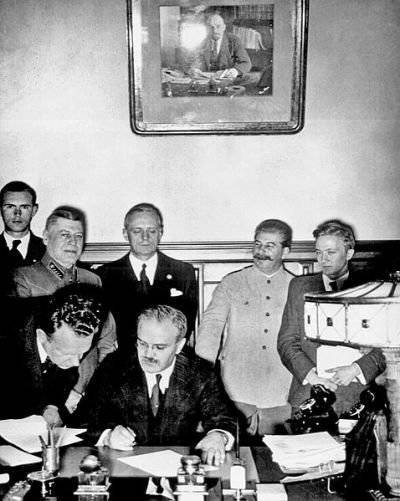
The signing by the Soviet Union and Germany of the non-aggression treaty of August 23 of 1939 of the year was a big surprise for the entire international community. The sudden rapprochement between the two countries, openly hostile to each other, turned out to be an incredible, but nonetheless accomplished fact. The abrupt change in the balance of power forced the leading powers of that time, such as Great Britain, the United States, France and Japan, to reconsider their policies and act in the conditions of a new reality. But the reality was this: in the near future, the Soviet Union and Germany are not going to fight each other.
To understand the reasons that prompted the leadership of the two countries to sign this document, it is necessary not only to analyze the geopolitical situation at the time of signing the contract, but also the events preceding it.
January 30 1933, Adolf Hitler was appointed Reich Chancellor (that is, head of government). In the same year, the Communist and Social Democratic parties were banned, and in the next, the institution of the presidency was abolished. The Nazis who came to power very quickly established control over the state and society, actively introducing the ideology of national socialism and revanchism into the masses. A course was taken for the restoration of the German armed forces and the militarization of the economy.
The establishment of a regime hostile to the USSR in Germany naturally led to a sharp deterioration in relations between the two countries. For the 11 months of 1933, only (since February), the Soviet embassy in Berlin has sent a note of protest to the German Foreign Ministry 217 (A. Martirosyan. Who led the war in the USSR? M., 2007. S. 434.). Cooperation in the military and economic spheres suffered. After the 2 trade agreement of May 1932 was declared null and void, for the first half of the year alone, Soviet exports to Germany decreased by 44% (A. Martirosyan. Who led the war in the USSR? M., 2007. S. 434.). German exports to the USSR also fell sharply. In addition, contacts between the military of the Red Army and the Reichswehr ceased. Schools in the Soviet Union, where the joint training of the Soviet and German military took place, were closed in the 1933 year, shortly after Hitler came to power (SA Gorlov, Top Secret: Alliance Moscow - Berlin, 1920-1953 M., 2001. C. 220.).
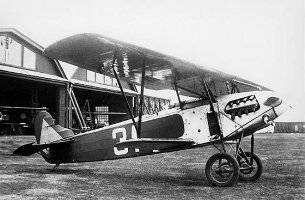
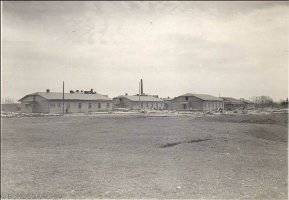
Tank a school in Kazan, a flight school in Lipetsk, and the Tomka chemical facility — the only military facilities in the USSR where the German military were trained — were closed shortly after Hitler came to power.
One of the first serious incidents in the Soviet-German relations of that time was the conflict around the Society for the sale of Soviet oil products Derop, which was eliminated after a series of organized pogroms that were clearly anti-communist in nature. At the same time, the Derunaft limited liability company was liquidated, which also represented the interests of the USSR on the German oil market. All this happened against the background of the Fuhrer's anti-communist rhetoric and repression against the Communists.
Nazi economic miracle.
As mentioned above, after Hitler came to power, the process of rapid growth of the German economy began, which would later be called "the Nazi economic miracle." From 1933 to 1939, Germany’s GDP grew by 2,2 times. Along the way, the militarization of the economy took place: from 1933 to 1939, budgetary expenditures on armaments grew almost 10 times (from 1,9 to 18,41 billion marks). As a percentage, their growth increased from 24 to 58% (Collection. How the German sword was forged. Industrial potential of the Third Reich. M .: Yauza-Eksmo, 2006. With 13.). In addition, there was a reduction in unemployment (from 4,80 million in 1933 to 0,91 million in 1937) ((Collection. How the German sword was forged. Industrial potential of the Third Reich. M .: Yauza-Eksmo, 2006. With 13.) and the intensive construction of autobahns.
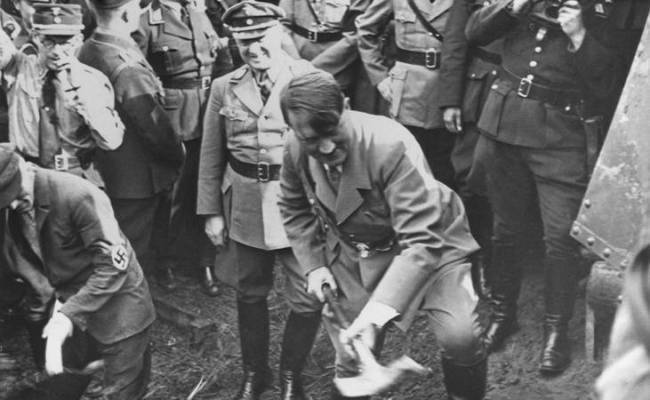
Adolf Hitler sets an example to other Germans, digging ground for the autobahn.
However, the "Nazi economic miracle" did not appear out of nowhere. He had several components:
- The gradual exemption of Germany from the payment of reparations through the adoption of new plans for their payments, namely the Dawes Plan and the Young Plan. The Dawes Plan of 16 August 1924 of the year provided for a new procedure for reparation payments, in accordance with which their size was adjusted to the economic possibilities of the Weimar Republic. In addition, Germany provided an initial loan in 800 million marks (in the period 1924-1929gg. The amount of loans issued to the United States of the Weimar Republic, amounted to 21 billion marks)(Preparata GD Hitler Inc. How Britain and the United States created the Third Reich. M .: Generation, 2007. C. 251.).
The second reparations payment plan, known as the Young Plan, was adopted at the Hague Conference on Reparations 1929-1930. It provided for the reduction of reparation payments to 2 billion marks a year (in 1928, the amount of reparation payments amounted to 2,8 billion marks), the abolition of the reparation tax on industry and transport. However, the most important provision of this plan was the liquidation of foreign control bodies that monitored the payment of reparations.
However, this was not enough for some participants in the reparations conference, and in 1931, a moratorium was declared on the payment of reparations. Officially, Jung's plan was canceled in 1932; it was replaced by the Lausanne Agreement of 9 in July of 1932 on Germany buying out three billion gold marks of its reparation obligations with the redemption of redemption bonds over 15 years. After Hitler came to power in 1933g. reparation payments ceased, which, however, did not lead to any sanctions against Germany.
- Active financing of the German economy by Western countries. In addition to reducing reparation payments, intensive lending to the German economy and the penetration of foreign campaigns into it continued. Great Britain and the USA have succeeded in this. In April, 1933, as well as 10 in August and 1 in November, 1934 concluded a number of agreements on the Anglo-German agreements: on coal, currency, trade, and payment. According to the latter, for every 55 of pounds sterling spent by Germany on the purchase of British goods, England pledged to buy German goods worth 100 pounds sterling (A. Martirosyan. Who led the war in the USSR? M., 2007. S. 438.). In addition, an important role was played by the investments of British and American companies that controlled many sectors of the economy of the Third Reich.
The breakdown of economic ties with the Soviet Union and the ousting of its companies from the German economic space was accompanied by the seizure of this space by companies of Great Britain and the USA. So, after the liquidation of Derop and Derunaft societies on the German oil market, the British company Royal Dutch Shell firmly established itself. Not far behind the UK and the USA. American company Standard Oil owned 90% of all capital of the German-American oil company (Preparata GD Hitler Inc. How Britain and the United States created the Third Reich. M .: Generation, 2007. C. 332.). In addition to the oil industry, other strategic industries were under the control of the Anglo-Saxons.
For example, a conglomerate of German chemical industry concerns IG Farben Industry, in 1926 year, concluded trade agreements with the American Dupont concern and the British Imperial Chemical Industries. Later, in 1929, a subsidiary campaign of the American Chemical Corporation was opened in the USA, through which the American bank JP Morgan provided loans. At the same time, the General Motors automobile concern, owned by the Dupont family only from 1932 to 1939, 30 million dollars to the German conglomerate (Preparata GD Hitler Inc. How Britain and the United States created the Third Reich. M .: Generation, 2007. C. 332.). This conglomerate, among other things, specialized in the production of explosives and toxic substances. The General Electric Company, a German company specializing in the electric power industry and mechanical engineering, also came under the control of British and American firms.
Thus, the "Nazi economic miracle" is a carefully planned and organized operation to restore the German economy through the gradual abolition of reparation payments, the provision of profitable loans, and the establishment of control over strategically important sectors of German industry.
The policy of appeasement.
The conditions of the Versailles Peace Treaty, signed on June 28 of 1919, were extremely difficult and humiliating for Germany. Under the terms of this agreement, Germany not only suffered tangible territorial losses (colonies in Africa and Asia, Lorraine and Alsace in the west, Poznan and Pomerania in the east), but also pledged to pay reparations in the amount of 33 billion dollars. In addition, the entire German part of the left bank of the Rhine and the right bank of the 50 km width were subject to demilitarization (in 1923, this area was occupied by French troops; this event was included in history like the Ruhr conflict). The terms of the agreement also included limiting the size of the regular army (not more than 100 thousand people), abolishing military service, a ban on having modern armored vehicles in service, and Aviationas well as naval transfer fleet into the hands of the allies (Versailles Peace Treaty, translated from French, M., 1925.).
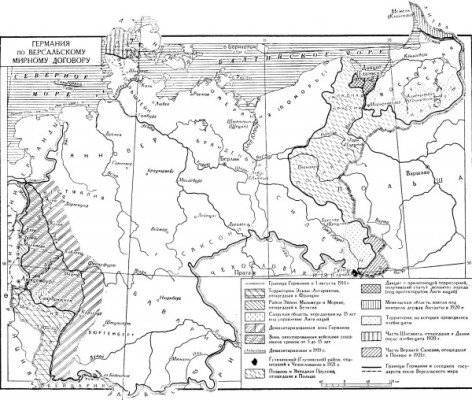
German territorial losses after the Versailles Treaty 1919g.
The Versailles system, built by the victors, was aimed at depriving the defeated Germany of even the theoretical possibility of restoring its power and being an equal partner of the victorious powers in the First World War. The occupation of the most important industrial region of Germany, reparations, and the actual prohibition of having full-fledged armed forces, coupled with hyperinflation and chaos in management, made this really impossible.
However, with the advent of Adolf Hitler to power, the situation began to change rapidly. “March 9 1935 was announced the official existence of German aviation, and March 16 - that the German army will continue to be based on compulsory universal military service” - writes the famous British statesman Winston Churchill (Churchill U. World War II. M .: Voenizdat, 1991. T. 1. C. 42.). It was a flagrant violation of the Versailles Treaty, which, however, did not entail any sanctions against Germany.
After the adoption of the “Law on the construction of the Wehrmacht”, the number of German armed forces began to increase with overwhelming speed and reached 4 million 233 by the start of the Second World War. thousand people That is, in 4, the number of German armed forces increased 42 times (A. Martirosyan. Who led the war in the USSR? M., 2007. S. 142.).
In parallel with this, the process of equipping the German army with modern types of weapons openly took place. Already by March 1935g. Luftwaffe (Wehrmacht Air Force) numbered 1888 machines and 20 thous. ps of attendants. K 1 October 1935. the first large Wehrmacht tank units were formed, which included a total of 1200 tanks. In addition, 18 June 1935g. The Anglo-German Maritime Agreement was concluded, according to which Germany received the right to have a fleet, in tonnage equal to 35% of the total displacement of the naval forces of the British Empire. The tonnage of the German submarine fleet was set at 45% of the total tonnage of submarines (British Empire Churchill W. World War II. T.1. M .: Voenizdat, 1991. C. 46.).
It is the rapid growth of the German armed forces that Western historians and statesmen of that time determine the so-called "policy of appeasement" - the policy of concessions in relation to Hitler's Germany, which was carried out in the period 1933-1939gg. The lack of reaction to the open re-establishment of the German armed forces gradually shifted to territorial concessions.
The first concession of this kind was the remilitarization of the Rhineland. 7 March 1936. German troops in the number of 19 battalions were introduced into the region, 3 of them crossed to the west bank of the Rhine. The French covering army, many times superior in number, approached the borders of the Rhineland, but did not enter its territory. The reaction of the French government was limited to a declaration that strongly condemned the occupation of the Rhineland. However, no concrete actions were taken, although the French had every opportunity and full right to oust the German troops from the territory they occupied.
Even more characteristic was the reaction of the UK government. Especially worth mentioning is the position of British Foreign Secretary Anthony Eden, who called on France not to take military action against Germany and the statement of Lord Lothian (British Ambassador to the United States): "In the end, the Germans just went into their garden" (Nicolson H. The Harold Nicolson Diaries: 1919-1964 (Weidenfeld & Nicholson, 2004) P. 139.).
There were no demonstrations against remilitarization of the Rhineland. On the contrary, several demonstrations were organized, demanding "maintaining peace" and "preventing the use of military force on the continent." Prime Minister Stanley Baldwin stated that Britain “does not have enough resources” to stop the Germans, and that in any case “public opinion” will not support military action on the continent (Taylor, AJP The Origins of the Second World War, London: Penguin 1961, 1976. P. 132.).
However, was the fear of an open clash with Hitler Germany really behind the inaction of the powers? After all, in 1936g. the process of increasing the number of German armed forces and modern weapons has just begun. At that time, Hitler did not yet have modern tanks and aircraft, which would later become legends of the Second World War. Consider this with specific examples.
Light tanks Panzer I and Panzer II even during the Spanish Civil War (1936-1939) showed the weakness of their weapons and booking. The first full-fledged Panzer III Panzer IV tanks, which had artillery (and not machine-gun) weapons and better booking, were mass-produced only in 1937. But the legendary "Tigers" and "Panther" was not yet in the project.
The same thing happened with the aircraft. The main fighter of the Luftwaffe during the 1935-1936 period. There was a classic Heinkel He 51 biplane. This design scheme is more typical for aircraft 1920-x., But in 30-e is already outdated. The modern fighter Bf.109 and the dive bomber Ju 87 began to be mass produced in the same 1937. A similar situation was with kriegsmarine (German Navy). The construction of a modern surface and submarine fleet has just begun.
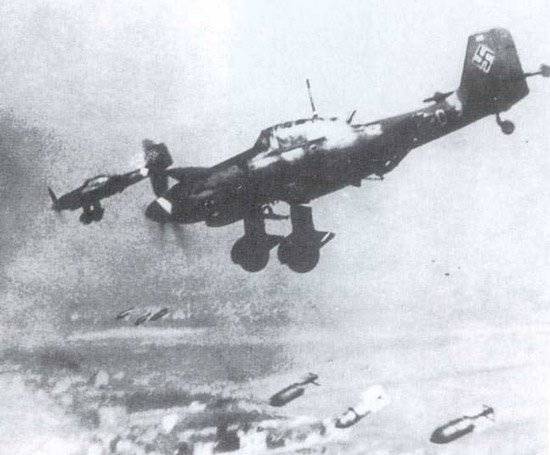
The Ju-87 dive bomber, one of the most famous symbols of World War II, went into serial production in 1937 and was built according to technology taken out of Detroit (Preparata GD Hitler Inc. How Britain and the United States created the Third Reich. M .: Generation, 2007. C. 333.)
In this situation, the United Kingdom and France had every chance of winning a military confrontation. The peacetime French armed forces numbered more than 1 million people, 550000 of whom were found in the territory of the metropolis. To this 3 should be added thousands of tanks and combat aircraft, as well as the fourth largest fleet in the world. Britain also had the world's first fleet, as well as about 1,5 thousand aircraft, not counting ground forces (History of the Second World War 1939 – 1945 in 12 volumes. Edited by A. A. Grechko. M .: Voenizdat, 1973-1982. Volume 2. On the eve of the war. M .: Voenizdat, 1974. C. 402-405 .).
It is extremely doubtful that the armed forces of Germany, which were then at the stage of formation, were able to successfully withstand the well-equipped and trained forces of Great Britain and France, which, moreover, were significantly superior to the Wehrmacht in numbers. It was enough just a collective ultimatum, supported by the occupation of the Rhineland and the mobilization of the armed forces, in order to prevent any attempts by Germany to redraw the map of Europe established by the Versailles system. Not to mention such economic sanctions as the return of reparation payments and the termination of lending to the German economy.
None of the above measures have been implemented.
In order to explain the reasons for such strange pliability and malleability, the most varied versions are put forward, ranging from the economic crisis that allegedly did not allow the allies to wage a long war, up to "psychological unpreparedness" for a big war. Here is what Winston Churchill wrote about this: “Until the middle of 1936, Hitler’s aggressive policy and breach of contract did not rest on the strength of Germany, but on the disunity and timidity of France and England, as well as on the isolation of the United States” (Churchill U. World War II. M .: Voenizdat, 1991. T. 1. C. 172.). What caused the “fragmentation” and “timidity” of France and England, as well as the isolation of the United States, if at that time they had all the opportunities in the bud to extinguish Hitler's aggression?
The true goals of the “policy of appeasement” become clear if we recall the state with which Germany’s relations worsened immediately after the establishment of the Nazi regime. It was the Soviet Union.
Adolf Hitler did not hide his hostility towards the Land of the Soviets and its ideology. Even in his autobiographical book, Mein Kampf, he wrote:
“We, the National Socialists, quite deliberately put an end to all German foreign policy before the war. We want to return to the point at which our old development of 600 interrupted years ago. We want to stop the eternal German aspiration to the south and west of Europe and definitely point the finger towards the territories located in the east. We finally break with the colonial and commercial policies of the pre-war period and consciously turn to the policy of conquering new lands in Europe. When we talk about the conquest of new lands in Europe, we, of course, can have in mind, first of all, only Russia and those marginal states that are subordinate to it. Fate itself points us with your finger ... This giant eastern state is inevitably doomed to ruin. All the prerequisites are ripe for this ... " (Hitler A. Mein Kampf. M .: Ed. "T-Eye.", 1992. With 341.).
In addition, the author is building a foreign policy line in relation to two other main opponents of Germany in the First World War. The quintessence of his thesis in relation to France is the following:
“We must understand the following: France is and will be the most deadly enemy of the German people” (Hitler A. Mein Kampf. M .: Ed. "T-Eye.", 1992. With 324.).
At the same time, the future Fuhrer characterizes the UK quite differently:
“England’s desire has been and remains to prevent any European continental power from growing into a world factor, for which England needs the forces of individual European states to balance each other ... France’s desire has been and remains to prevent Germany has truly become a single state with a single strong leadership, for which it systematically supports the idea of turning Germany into a conglomerate of small and smallest states, whose forces mutually balance each other ... The objectives of French diplomacy in the final analysis are contrary to the goals and trends of British state art. Who from this point of view will weigh the possibilities remaining for Germany, he will inevitably have to come with us to the conclusion that we have to seek rapprochement only with England ... Of course, British statesmen will always stick to pro-British policy, and not pro-German. But things may turn out that it is precisely the interests of the pro-British policy for various reasons to some extent coincide with the interests of the pro-German policy ... For a whole period of time for Germany, only two allies in Europe are possible: England and Italy " (Hitler A. Mein Kampf. M .: Ed. "T-Eye.", 1992. With 321.).
The task of this article is not to find out what role external forces played in the coming of the Nazis to power. However, it is worth noting that the establishment of the Nazi regime in Germany, the main direction of expansion was directed to the east, fully meeting the geopolitical interests of England, as well as its desire to fight by proxy. This also answered the British unwillingness to see France as the dominant continental European power.
From this point of view, all the actions of Great Britain are quite logical: in the economy - the abolition of reparations, favorable agreements for Germany and lending. In foreign policy, ignoring violations of the Versailles Treaty and territorial concessions pushing the Fuhrer to new gains. The same policy was followed by the USA.
The situation with France was somewhat more complicated, since this policy directly threatened its national interests and security. However, it should not be forgotten that, despite the powerful armed forces, the presence of colonies and other signs of a colonial power, France focused on England on many issues of foreign policy. Interesting in this regard are the testimonies of the defendants of the Nuremberg process. “The Führer,” reports Goering, “often said that France would do nothing without the approval of England, and that Paris had become the London diplomatic branch. Consequently, it was enough to settle the matter with England, and then everything is in order in the West ”(Cartier R. Secrets of War. After Nuremberg. M., 2005. C. 39.). Thus, the calculation of the eastern direction of the expansion of Germany, together with the pro-British orientation of foreign policy, led France to deliberately neglecting national security issues (which, in the end, cost her dearly).
Meanwhile, the expansion of Nazi Germany continued in full swing. 12-13 March 1938g. Austria (Anschluss) was annexed to Germany, to which the UK reacted with a formal protest (March 14) followed by recognition (April 2). It is symptomatic that, following Britain, the Anschluss was recognized by France.
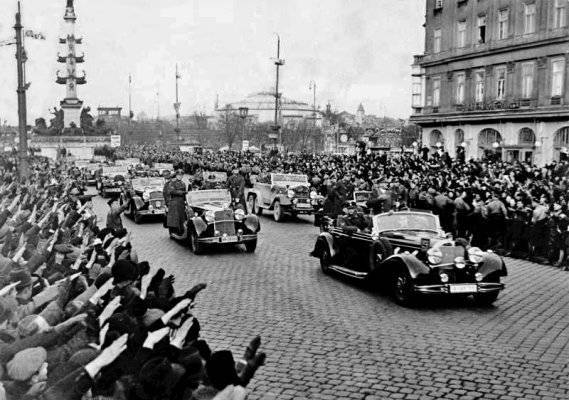
The triumphal entry into Vienna was not without its roughness: “Despite the excellent weather and good conditions, most of the tanks failed. Defects of heavy motorized artillery were discovered, and the road from Linz to Vienna turned out to be blocked by stopped heavy machines ”(W. Churchill World War II. M .: Voenizdat, 1991. T. 1. C. 122.)
The next victim was Czechoslovakia. The cause of the German claims was the Sudetenland, in whose territory the Germans lived, the “Sudeten German party” of which began to advocate for granting territorial autonomy to the Sudetenland. Naturally, this was fully understood by the German government.
However, the government of Czechoslovakia did not want to make concessions, for which there was no reason: in the spring of 1938. Czechoslovakia's army outnumbered the Wehrmacht (34 versus 28 divisions). By the fall, the balance of power had changed, but even then the Czechs could put up 39 divisions of 1,8 million, 36 million, and 1,6 planes and 2400 Hitler tanks and 1200 tanks, respectively, against 1500 German divisions. (Volkov F. Secret becomes clear. M., 1989. C. 9.). That is, the superiority of the Wehrmacht was not at all overwhelming. At the same time, on the territory of the Sudetenland region, which was supposed to be a theater of operations, there were powerful fortifications, about which the Minister of Armaments and Military Industry of the Third Reich, Albert Speer, later wrote: “In the firing practice, our experts amazedly weaponwhich we were going to use against these fortifications, would not have the expected effect ” (Speer A. Memoirs. M., 1997. C.169.).
In addition, in the event of German aggression towards Czechoslovakia, the latter was to be helped by France. Under Article II of the Franco-Soviet Mutual Assistance Pact of 2 in May 1935, the parties pledged to provide immediate assistance and support to the other side if it becomes the object of an unprovoked attack by a third “European state”. In reality, everything was completely different.
Already at the first meeting devoted to the Sudeten crisis, which was held in London on April 28-30 on April 1938, British and French diplomats demanded that Czechoslovakia by all means avoid a military clash. The demands of Hitler to grant the Sudeten Germans autonomy went to the demands to include the Sudetenland in the Third Reich, and the demand of London and Paris to make concessions into ultimatums.
As a result, on September 29-30, a decisive meeting was held in Munich, in which Chamberlain, Daladier, Hitler and Mussolini took part. The outcome of the Munich Agreement was the inclusion of the Sudetenland region in the Third Reich and the actual dismemberment of Czechoslovakia, fully completed in March 1939, when Czechoslovakia split into the Czech Republic, occupied by Hitler, Slovakia and Transcarpathian Ukraine.
Of course, living in the Sudetenland of the German population was only a formal reason for the occupation. Sudetenland attracted Hitler for other reasons. William Shearer writes: “According to German data, the dismembered country was losing 66% coal production, 86% chemical industry production, 80% cement production, 70% pig iron smelting, 70% electricity generation and 40% wood processing industry” (From Munich to Tokyo Bay: A look from the West at the tragic pages of the history of the Second World War: Translation. / Comp. E.Ya. Troyanovskaya. M .: Politizdat, 1992. From 20.). In addition, in the territory of Czechoslovakia were located weapons factories "Skoda", which for the year gave products as much as was produced throughout the industry in the UK (Churchill U. World War II. M .: Voenizdat, 1991. T. 1. C. 150.). Now all this wealth went to the Führer for free.
On the example of the Munich Agreements, it can be seen that the leading world powers of that time carried out a deliberate surrender of their positions to Hitler in order to provoke him to further aggression in the eastern direction. This was covered up by "timidity", "disunity", "desire for peace" and other arguments. At the same time, all the proposals of the Soviet Union were ignored, which will be discussed below.
Collapse of the collective security system.
Of course, the leadership of the Soviet Union was aware that the sharp deterioration in relations with Germany that followed the Nazis came to power was primarily due not to the ideological differences and the anti-communist rhetoric of the Fuhrer, but to its internal policies and territorial aspirations. It was obvious that the future expansion of Hitler's Germany (if it was given a course) would be directed, first of all, to the east. And the main purpose of this expansion will be the territory of the Soviet Union, the very “space in the East”, about which Hitler wrote in “Main Kampf”. The key question was how the leading European powers of the time, Great Britain and France, as well as the United States, would react to the Fuhrer’s aggressive encroachments. By their actions (or inaction), it was possible to understand whether the restoration of a strong Germany corresponds to their geopolitical interests, or not. The development of a further foreign policy depended on this.
To this end, the Soviet Union began to pursue a policy of creating a collective security system, the essence of which was to conclude treaties on mutual assistance in order to prevent aggression in Europe. This concept 29 December 1933g. outlined by the Commissar for Foreign Affairs M. Litvinov at a session of the CEC.
Initially, the concept was successfully implemented. Along the way, there was a strengthening of the authority of the USSR in the international arena. September 18 1934. The USSR was adopted by the League of Nations, and immediately became a permanent member of its Council. Even earlier, in November 1933. USSR recognized the United States.
At the beginning of 1934. negotiations began on the conclusion of the Eastern Pact - a system of treaties on mutual assistance between the USSR, Czechoslovakia, Poland, Finland, Estonia, Latvia and Lithuania, which would guarantee the inviolability of their borders. In Western historiography, the Eastern Pact is called the “Eastern Locarno”, since this agreement was similar to the Locarno Agreements 1925, which guaranteed the inviolability of borders in Western Europe. The Eastern Pact was proposed by French Foreign Minister Louis Bart in the form of a bilateral agreement between the Soviet Union recognizing the Locarno Treaties and France recognizing the Eastern Pact. 14 June 1934. It was proposed to join the Eastern Pact to all interested states. Czechoslovakia (2 July 1934), Estonia (29 July 1934), Latvia and Lithuania (3 August 1934) agreed, Finland abstained. At the same time, Latvia and Estonia, as a condition for accession, demanded the inclusion of Germany and Poland in the Pact.
However, in the end, the attempt to conclude the Eastern Pact ended in failure. The position of Great Britain played a key role here: the British agreed to support the Eastern Pact, provided that Germany was included not only in the pact, but also in the French-Soviet bilateral treaty. France and the Soviet Union agreed, however, Germany (September 11 1934) and Poland (September 27 1934) refused to accede to the pact. Thus, the goal of ensuring the inviolability of borders in Eastern Europe has not been achieved. And, if Germany’s refusal to join the pact is understandable (in fact, it was directed against its territorial aspirations in the east), then the position of Great Britain in this matter was alarming. The actual refusal of the British to join the Eastern Pact and thus maintain the inviolability of borders in Eastern Europe testified that at the moment this did not correspond to their foreign policy interests.
Not the last role was also played by the assassination of the initiator of the Eastern Pact, French Foreign Minister Louis Barth, which occurred on October 9 on 1934. His successor in this post, Pierre Laval, adhered to other views on the foreign policy line (recall that the remilitarization of the Rhineland took place during his tenure as Minister of Foreign Affairs).
The failed attempt to conclude the Eastern Pact was the first in a series of attempts by the USSR to create a collective security system. The failure in the conclusion of the Eastern Pact showed the Soviet leadership that intentions to prevent further strengthening of Nazi Germany did not meet with adequate support from Western partners. Subsequent events confirmed this trend.
2 May 1935. The Franco-Soviet Mutual Assistance Pact was concluded. The main article of this treaty was Article II, which obliged the parties to provide immediate assistance and support to the other party if it became the object of an unprovoked attack by a third "European state" (The history of diplomacy. Edited by V.P. Potemkin. M .: Politizdat, 1959 — 1979. C. 397.). The contract was concluded for five years with automatic renewal. However, the supplementary agreement designed to regulate the practical aspects of cooperation was ratified only after Laval’s resignation.
Meanwhile, the situation continued to escalate. In July, 1936. the Spanish Civil War began, during which the USSR supported the Republican government of the Popular Front, and Germany and Italy supported the rebel forces of General Franco. This war has become for both sides a kind of testing ground for the acquisition of technology and the acquisition of combat experience. Especially distinguished in this regard, Germany and Italy: in the period 1936-1939gg. 16000 of the German military and 72000 of the Italian military (against the Soviet 5000) took part in the conflict (Soria G., Pozharskaya S. War and Revolution in Spain. 1936-1939. M., 1987.t 1. With 221.). In addition, both sides actively supplied the warring artillery, armored vehicles and aircraft.
The Spanish Civil War contributed to the further deterioration of Soviet-German relations. 25 November 1936. Germany and Japan concluded Anti-Comintern, which created a bilateral bloc of these states, directed against the countries of the Third Communist International (Comintern). The treaty provided for the exchange of information regarding the activities of the Comintern and support for anti-communist regimes. In November, 1937. Italy joined the Anti-Comintern Pact. In the autumn of the same year, a real “consular war” unfolded between Germany and the USSR, as a result of which 5 German consulates from 7 were closed in the USSR, and in Germany - 2 from Soviet consulates from 4 (Rozanov G.L. Stalin - Hitler: A Documentary Essay on Soviet-German Diplomatic Relations, 1939 –1941 Moscow: International Relations, 1991. With 39.).
The final futility of attempts to build a collective security system was demonstrated by the events of 1938: the aforementioned Anschluss of Austria and the Munich Agreement of 30 of September of 1938. The peculiarity of the latter is that not only the Franco-Soviet Mutual Assistance Pact of 2 in May of 1935 were ignored, but also the attempt of the Soviet Union to render military assistance to Czechoslovakia was blocked. At the same time, an agreement on the actual dismemberment of Czechoslovakia was made without any participation of representatives of the USSR.
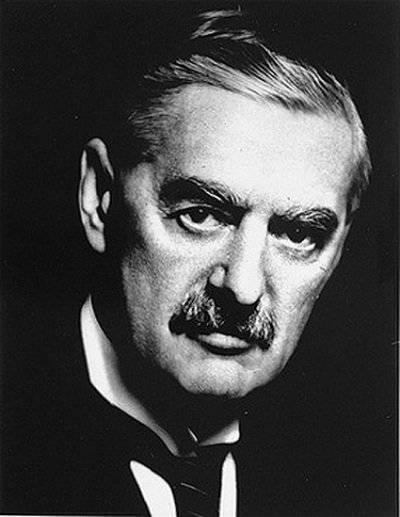
Neville Chamberlain: “I have to confess to the deepest distrust of Russia, I don’t even believe in her ability to conduct successful offensive actions, even if she wanted. And I do not believe her motives "
After the Munich agreements 1938. it became finally clear that the Soviet Union’s foreign policy on building a collective security system did not meet with the support of the leading powers, led to international isolation, and therefore needed a radical revision. The key task of Soviet diplomacy was not to build a collective security system, but to search for allies in the coming geopolitical confrontation. Further events developed in this vein.
27 August 2013 g
Information